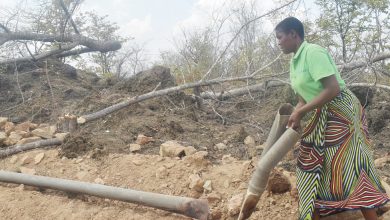Irrigation restores hope among rain-starved farmers
For a majority of farmers in Malawi, the month of May marks the ending of the harvesting season—the beginning of a recess that spans nearly half a year.
The growers, who only plant during the rainy season, take their hands off everything to do with agriculture, which employs over 80 percent of Malawians of working age.

The mundane cycle worries policymakers and growers who tout irrigation as an underused weapon against chronic hunger and widespread poverty.
“A country that thrives on agriculture cannot afford to leave its farmland untouched for months, especially after dry spells that scorched crops early in the ending rainy season,” says Steven Mkhuluma, an agricultural extension development officer in Zomba District.
He shares tips that help farmers harvest and earn more from their small plots amid climate change.

“Irrigation is the way to go because it guarantees a farmer two or three harvest every year,” Mkhuluma says. “While many are gazing at the skies waiting for unpredictable rain, irrigation farmers can control when to water their crops and how much water to release.”
His extension planning area is home to the 156-hectare (ha) Mlooka Irrigation Scheme launched in December 2023. The solar-powered scheme along the banks of the Shire River gives farmers in the hilly community three harvests thrice a year—and winter crops are emerging from the ground.
“Our area struggles with chronic dry spells. It’s located in the rain shadow of Zomba Mountain. This is why the community asked for the irrigation scheme,” he says.

The scheme has turned the wetland into one of the top rice-growing spots in the Southern Region.
It supports at least 720 farmers from surrounding villages, who support over 5 000 people.
Throughout the year, crops paint the vast valley green, cancelling a past to forget when it was often desiccated to cracking crust by drought.
Government constructed Mlooka Irrigation Scheme under the Programme for Rural Irrigation Development (Pride) funded by Ifad to the tune of K3.211 billion.
It is one of the six irrigation schemes supported by the UN financing mechanism for rural development based in Rome.
Apart from Mlooka, they include Wowo in Phalombe District, Marko and Mafinga in Chitipa, Mzenga in Nkhata Bay, Dambo in Dowa and Chipofya in Rumphi.
Pride seeks to develop 3 115ha of irrigated farmland and 12 300ha of rain-fed fields for the benefit of about 19 500 households of 950 000 people.
This gives a glimpse of the national ambition to irrigate 220 000ha by 2035.
The Ministry of Agriculture reports that almost 408 000ha of the country’s land size are favourable for irrigation.
Irrigated farmland has expanded from 104 000 to 152 000 since 2015 when the Malawi Irrigation Master Plan and Investment Framework was set up, according to the ministry.
This means the country is only ultilising slightly over a third—37 percent—of the potential sites which could help the country overcome hunger and poverty come rain or sunshine.
“Before the opening of our scheme, we were starving in the middle of plenty. We were waiting for unpredictable rains, forgetting the abundant water that flows past our fertile valley as the Shire glides to the Zambezi on the way to the Indian Ocean,” says Amadu Dula, a farmer, who reaped 18 bags of rice from his 0.2acre plot.
His lamentation brings to mind the lyrics of reggae icon Bob Marley hit, Rat Race: In the abundance of water, a fool is thirsty.
This is the irony of Malawi, where erratic rains plunge millions into perennial hunger even though water covers one-fifth of the country’s total land area.
The farmers like Dula trust irrigation to avert the irony.
They are delighted with a 70-metre stone-paved channel that now diverts water from the Shire to the irrigation scheme.
At the heart of the irrigation scheme, 570 solar panels transform sunlight into electricity for running pumps that lift water into a 1.5km pipeline to hilltop tanks from where it flows freely to the fields.
“Each farmer has a plot measuring 40m by 40m which produces 25 bags of rice. A 50kg bag fetches between K75 000 and K100 000. These are millions and there is no excuse for one to starve or remain poor,” she states.
Mlooka Water Users Association member Kingsley Maulidi bought a motorcycle at K1 million after selling 20 of his 36 bags. He also bought a TV and electrified his home.
“If you are serious with farming, irrigation can transform your life,” Maulidi says. “With the scheme, we no longer labour in vain as many did when we were relying on rain alone. As crop yields keep rising, people once affected by hunger and poverty have enough food for their families and surplus for sale.
The farmers have formed a cooperative with 58 members to enhance their collective bargaining for financing, farm inputs and fair prices selling prices for their produce.
The group has applied for a matching from the Agriculture Commercialisation (Agcom) to construct a warehouse and acquire a tractor and a rice mill. Funded by the World Bank, Agcom is the government’s flagship initiative to ramp up agricultural productivity and commercialisation, a pillar of the Malawi 2063 agenda to transform the country into a self-reliant, upper middle-income economy by the centenary of self-rule.
“Farming is rewarding, but we cannot fully benefit from irrigation unless we graduate from using hoes and storing our harvest in places where rats and weevils feast on the grain,” Maulidi states.
Director of Irrigation Geoffrey Mwepa says the emerging schemes illustrate “tremendous progress” in the national ambition to increase irrigated hectares.
“At this trend, the Master Plan target of having 220 000 hectares under irrigated agriculture by 2035 will be achieved with investments by government, private sector as well as non-governmental organisations with support from development partners,” he says.
Last December, government revised the National Irrigation Policy of 2016.
He explains: “The Government of Malawi found it necessary to revise the policy so that irrigation can effectively contribute to increased agricultural productivity and commercialisation in consistency with the aspirations of Malawians as reflected in Malawi 2063.
“Since the inception of the 2016 policy, a number of new developments have happened.”
The policy shift was partly necessitated by rising calls for strengthened farmer organisations to achieve transparency and accountability in the management of smallholder irrigation schemes and promotion of public-private partnerships.
Other considerations included sustainable management of land and water resources and the agenda to focus beyond food security in favour of commercial farming, industrialisation and expanding exports.
The new policy provides guidance to all providers of irrigation goods, works and services to effectively contribute to boosting the country’s income levels, food security and sustainable economic development, according to Mwepa.
““As irrigation is one of the priority interventions in the Malawi 2063, government is committed to funding irrigation feasibility and design studies, construction of irrigation schemes as well as support beneficiaries in effective operation and maintenance of irrigation schemes,” Mwepa states.
Minister of Agriculture says irrigation could boost both production and commercialisation amid extreme shocks made more frequent and devastating by climate change.
During a visit to Bwanje Valley Irrigation Scheme in Dedza District last month, he told journalists: “Irrigation is the only way we need to take now. Malawi has all the necessities for irrigation to help us overcome persistent food insecurity.
“The government is committed to supporting irrigation farming systems in the country and has since released K99 billion to enhance agricultural productivity.”
And the farmers sound optimistic to walk out of poverty.
“We are tired of living on handouts. We want to become self-sufficient. This is why we work hard and take care of the irrigation investment so that we can reap the benefit for over a century. I hope future generations will benefit too.”





